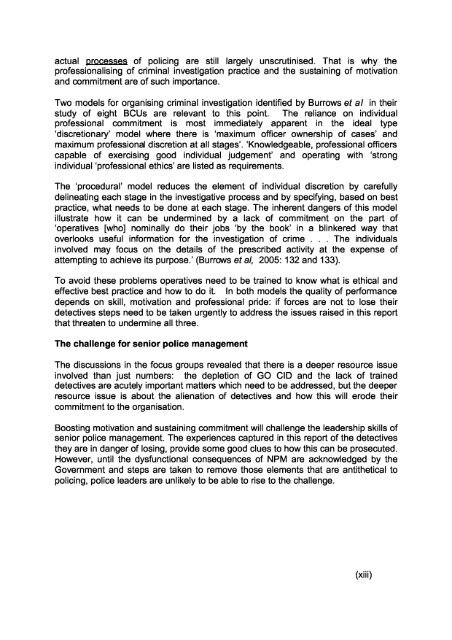LOSING THE DETECTIVES: VIEWS FROM THE ... - Police Federation
LOSING THE DETECTIVES: VIEWS FROM THE ... - Police Federation
LOSING THE DETECTIVES: VIEWS FROM THE ... - Police Federation
Create successful ePaper yourself
Turn your PDF publications into a flip-book with our unique Google optimized e-Paper software.
actual processes of policing are still largely unscrutinised. That is why the<br />
professional ising of criminal investigation practice and the sustaining of motivation<br />
and commitment are of such importance.<br />
Two models for organising criminal investigation identified by Burrows et al in their<br />
study of eight BCUs are relevant to this point. The reliance on individual<br />
professional commitment is most immediately apparent in the ideal type<br />
‘discretionary’ model where there is ‘maximum officer ownership of cases’ and<br />
maximum professional discretion at all stages’. ‘Knowledgeable, professional officers<br />
capable of exercising good individual judgement’ and operating with ‘strong<br />
individual ‘professional ethics’ are listed as requirements.<br />
The ‘procedural’ model reduces the element of individual discretion by carefully<br />
delineating each stage in the investigative process and by specifying, based on best<br />
practice, what needs to be done at each stage. The inherent dangers of this model<br />
illustrate how it can be undermined by a lack of commitment on the part of<br />
‘operatives [who] nominally do their jobs ‘by the book’ in a blinkered way that<br />
overlooks useful information for the investigation of crime . . . The individuals<br />
involved may focus on the details of the prescribed activity at the expense of<br />
attempting to achieve its purpose.’ (Burrows et al, 2005: 132 and 133).<br />
To avoid these problems operatives need to be trained to know what is ethical and<br />
effective best practice and how to do it. In both models the quality of performance<br />
depends on skill, motivation and professional pride: if forces are not to lose their<br />
detectives steps need to be taken urgently to address the issues raised in this report<br />
that threaten to undermine all three.<br />
The challenge for senior police management<br />
The discussions in the focus groups revealed that there is a deeper resource issue<br />
involved than just numbers: the depletion of GO CID and the lack of trained<br />
detectives are acutely important matters which need to be addressed, but the deeper<br />
resource issue is about the alienation of detectives and how this will erode their<br />
commitment to the organisation.<br />
Boosting motivation and sustaining commitment will challenge the leadership skills of<br />
senior police management. The experiences captured in this report of the detectives<br />
they are in danger of losing, provide some good clues to how this can be prosecuted.<br />
However, until the dysfunctional consequences of NPM are acknowledged by the<br />
Government and steps are taken to remove those elements that are antithetical to<br />
policing, police leaders are unlikely to be able to rise to the challenge.<br />
(xiii)
















